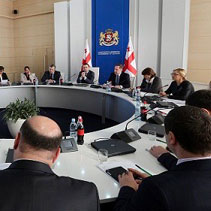
Statement of the Ministry of Reconciliation after the call of NGOs
By Anastasia Sokhadze
Friday, August 21
According to the Ministry of Reconciliation, at the beginning of the pandemic information about coping with infection and preventive measures were translated into Abkhazian and Ossetian languages. According to them, in order to share the experience, online consultations for local doctors are held on a regular basis and Georgian specialists are always ready to give relevant advice .
Since the region opened to tourists on August 1st, there has been a sharp outbreak of infection in Abkhazia. On August 16th alone, 26 cases of COVID-19 infection were detected in Abkhazia, three times higher than the previous day and the highest rate.
The Georgian authorities have been urged to use both their own resources and the assistance of international organizations to assist Gali residents, and to involve them in the provision of basic necessities and medicines.
Part of the population living in the Gali district, who used to receive IDP benefits in the territory controlled by Georgia, is no longer able to receive assistance in the conditions of the pandemic due to the restrictions imposed by the de facto government.
According to the Georgian government, with the support of the Georgian authorities, a mission of the World Health Organization was carried out in the region of Abkhazia to assess the situation on the ground and develop recommendations.
To deal with the pandemic, the Georgian government and international organizations regularly provide medical equipment, medicines and hygiene items to the Abkhaz region. People infected with coronavirus are being treated in the controlled territory of Georgia. In particular, since the outbreak of the pandemic in the occupied Abkhazia, four patients, including two from the medical field, have been transferred to the central government-controlled area for treatment. One of them has already recovered while three are undergoing treatment.
A field hospital has been opened near the Enguri Bridge, where local doctors measure fever for each patient from the occupied territories and transfer them to various medical facilities according to complaints. In order to treat infected patients, the Gray Hospital was equipped and started work to build easier access to free medical care for the people living in the occupied territories.
According to the agency, up to 1,000 people have left the occupied territories controlled by the central government since March 22nd, of which 316 patients in need of emergency medical care were taken directly to hospitals with various diagnoses, and the person received appropriate medical care after quarantine.
The Office of the State Minister notes that in the direction of Akhalgori, the Tskhinvali region remains completely closed and artificially isolated. According to them, the government has immediately expressed its readiness to help the local population, both publicly and through international partners and the hotline, but so far this is not possible.
The only crossing in Abkhazia, which according to an EUMM study was carried out by up to 2,000 people a day, has been closed in Georgia since February 27th this year, after the first case of Coronavirus was detected in Georgia. In Tskhinvali, the Bibilov regime closed the administrative border much earlier.
Residents in the conflict zone speak of the unbearable humanitarian situation after the pandemic. The Georgian-speaking population of Gali and Akhalgori, in particular, who were mainly dependent on the Georgian market and Georgian pensions and social assistance, were particularly affected.
NGOs called on the Georgian government to step up humanitarian and medical assistance in the wake of the COVID-19 bomb blast in occupied Abkhazia on August 18th. According to the signatory organizations, it is important for the Georgian government and society to show drastic steps of solidarity.


